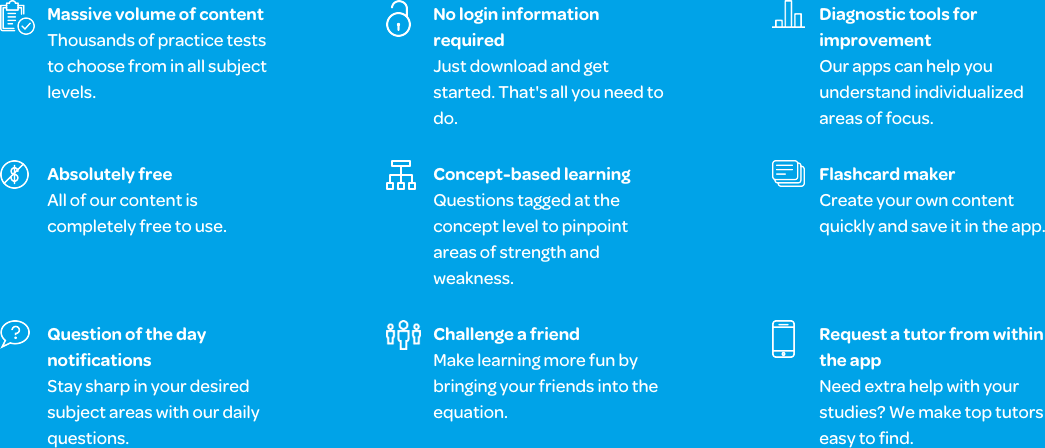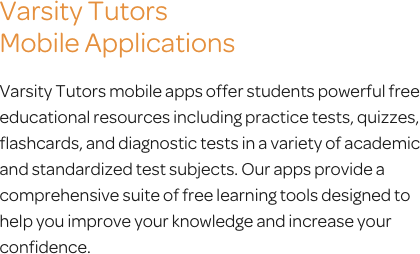The Varsity Tutors AP Latin Mobile App
Preparing for the AP Latin exam can be a challenging time. Not only must your English reading skills be proficient, but you must also be able to read and translate works from Latin literature. The two works include Vergil’s Aeneid and Caesar’s Gallic War. You must be capable of placing these in context and be able to think on a critical and historical level. Familiarity with the themes of ancient literature is important as well. You can’t expect to come upon the material right away and fully understand it. That’s why adequate preparation is necessary. If you use the Varsity Tutors AP Latin exam app for iOS and Android devices, you can get the valuable practice needed to succeed in the course and on the exam.
Course themes include literary genre and style, Roman values, war and empire, leaderships, history, and the views of non-Romans. These are often combined to demonstrate the interrelations between the seven major themes. You’ll be required to do a few things – these include reading and comprehending poetry and prose, translating previously prepared Latin texts into English, and analyzing linguistic and literary features of the text.
All of this may seem overwhelming. It can be even more so over the course of a three-hour exam. The AP Latin test has a 50-question multiple-choice section, which includes syllabus reading and sight reading of poetry and prose. An hour is allocated to this part. The free response section is 120 minutes and involves translation, an analytical essay, and a short answer component.
The AP Latin app includes Learning Tools that help make your study sessions productive and efficient. The app has Full-Length Practice Tests that enable you to experience the format of the exam, testing your knowledge, confidence, and endurance. Questions will require you to translate Latin text, poetry, and prose and also comprehend longer passages. The practice tests allow you to assess your proficiency using materials that have been used in the course and on the test before. Your performance is assessed after you complete the test, with scoring, percentiles, and speed tracking. All this information can be used later on to gauge how you’ve improved. In the areas you need more work, the detailed explanations to the answers that are provided will enhance your study materials. You may even share your scores and progress with tutors, teachers, and friends.
The app also includes shorter test exercises that concentrate on specific topic areas and include the same assessments at the end. There is also the Question of the Day, which consist of daily questions that are randomly selected and rotated, enabling quick practice exercises to brush up on topics. Flashcards are included as well. They let you pick specific topics as well and immediately see your answers. There are pre-made flashcards and ones you can create and customize, with pictures, audio, and video, on your smartphone. In a similar vein, the Learn by Concept interactive syllabus is organized by individual topics and sub-topics, letting you review questions, answers, and explanations in a series related to those areas you might still be trying to master.
The Varsity Tutors AP Latin Mobile App, available from iTunes or the Google Play Store, lets you learn and study a challenging subject in several different formats. With the tools provided, you can track your progress and feel more comfortable with the format of the exam ensuring you are ready on test day.
66 mobile apps to choose from for your tutoring needs.

Learn More
Advanced Placement (AP) Latin is one of eight courses in the AP World Languages and Cultures program. It is unique in that it focuses on just two of the most well-known works of Latin literature: Caesar’s “Gallic War” and Vergil’s “Aeneid.” It is typically taken by students who are in their senior year of high school. The course will help students to develop their sensitivities in literary, historical, and critical contexts, particularly while translating. AP Latin is a highly interactive course, and successful students will be proficient in discussion, debate, and presentation. As in other courses in the AP World Languages program, it will also expand students’ skills in analysis, cognition, and communication. This probably sounds pretty intense, but with study tools like Varsity Tutors’ free AP Latin app for iPhone, iPad, and Android device, you can develop a customized study plan to work to perform your best.
The AP Latin curriculum is divided into four general skill categories, all of which will be developed and applied to their coursework. The first is reading and comprehending the Latin language. Students must be able to demonstrate proficiency in this through identification of grammatical elements, context-dependent explanation of phrases and vocabulary, and text interpretation. They will develop a deep familiarity with the vocabulary within the texts, master the scanning of dactylic hexameter while reading epic Latin texts, become acquainted with the texts’ generic and stylistic features, and study the unique historical and cultural contexts that give weight to the meaning of the texts. Though the AP Latin Exam will not test students’ oral Latin skills, it is an extremely effective method of study. Reading aloud can help many students further develop and better retain their Latin reading and comprehension skills.
Translation is the second category. Students must translate from Latin to English as literally as possible in order to show their competence in Latin’s forms and functions. It is a complex skill that draws upon four foundational areas: proficiency in vocabulary, morphology, grammar and syntax, and a deep knowledge of the adjustments necessary to translate Latin into proper English. The English translation of a Latin word is largely dependent on context, and students who are most successful in translation will have a keen sense of the contextual and grammatical differences between the two. Significant and thorough practice is necessary to gain the sensitivity to translate Latin at the level required.
Third, students must develop adequate skills in contextualizing by going above and beyond the text alone; striving to understand the environment and period in which the author lived or the text is based. Students should be able to identify and explain why certain events, practices, and figures impacted the Roman world. To do this, they will need to retain a great deal of material regarding ancient Roman culture, history, and literature. This knowledge will help students delve more deeply into interpreting and analyzing the texts contextually. The five areas that are emphasized are Roman political ideas; Greco-Roman mythology and legend, Roman cultural products, perspectives, and practices; influential people and key historical events; and the conventions and authors of Latin literature.
Lastly, students must be able to analyze texts by demonstrating both reflective and critical reading skills. They should be comfortable exercising these abilities in both written and oral scenarios. With the skills and knowledge that they have developed in the areas of contextualization, translation, and comprehension, they will be able to clearly state the conclusions drawn from reflective, critical reading. Students will able to synthesize details and examples from a variety of sources into a coherent and persuasive argument that relates the details to the relevant concept, idea, or theme. They will also be proficient in drawing conclusions and making inferences from subtleties in the text’s usage and style. This category, along with the three previously discussed, are all covered comprehensively by Varsity Tutors' AP Latin app, available free from iTunes and the Google Play Store.
In addition to the four categories, there are seven themes that may be covered in AP Latin. These themes serve to diversify and enhance a student’s knowledge of the people, events, and issues of the Roman era. They include discussion of Roman values, the perspective of non-Romans, war and empire, leadership, human beings and the gods, history and memory, and literary genre and style. These themes help students to relate the texts they are reading and translating to the overarching themes of politics, history, legend, mythology, and culture. By incorporating these themes into AP Latin studies, students are able to gain a richer, more complex understanding of the era.
The AP Latin Exam tests the comprehensive range of knowledge and skills developed over the span of the course. It is divided into two sections, both worth 50 percent of the exam’s total score. Section I is made up of 50 multiple-choice questions that must be completed in one hour. Twenty of the questions are based on readings from the syllabus, and will be evenly split between Caesar and Vergil. Thirty questions are based on sight readings, and are divided between questions on both poetry and prose. The sight readings are selections that are not required reading, but are chosen from the sight-reading recommendations within the course description. Section II contains a variety of free-response questions. There are typically two ten-minute translation questions (one each on Caesar and Vergil), one 45-minute analytical essay, and two 20-minute essays, one based on the “Aeneid” in its entirety. The free practice tests available in the Varsity Tutors AP Latin app, available from iTunes or the Google Play Store, mimic these exam conditions so you can work to increase your score. Many colleges and universities will grant credit to students who score well on the AP Latin Exam, so it is vital that students dedicate a sufficient amount of time to preparation.
AP Latin is an intensive, upper-level language course that can demonstrate a student’s interest in and aptitude for the Latin language. Along with using your AP Latin Exam score to place you in a course of appropriate difficulty and award potential credits, colleges may also consider your score as a factor in admissions decisions. Students who are interested in majoring in linguistics, philosophy, history, or comparative literature will find AP Latin an especially useful course. Even students who are interested in becoming anthropologists, computer scientists, or medical scientists will be able to apply the concepts and skills learned in AP Latin to enhance their professional skillset. Through dedication and focus on the fundamentals, AP Latin students have the opportunity to establish a foundation that can support them in their post-secondary studies and in their professional field of choice. Get started mastering these concepts today by downloading the free Varsity Tutors AP Latin app to your iPad, iPhone, or Android-powered device.




